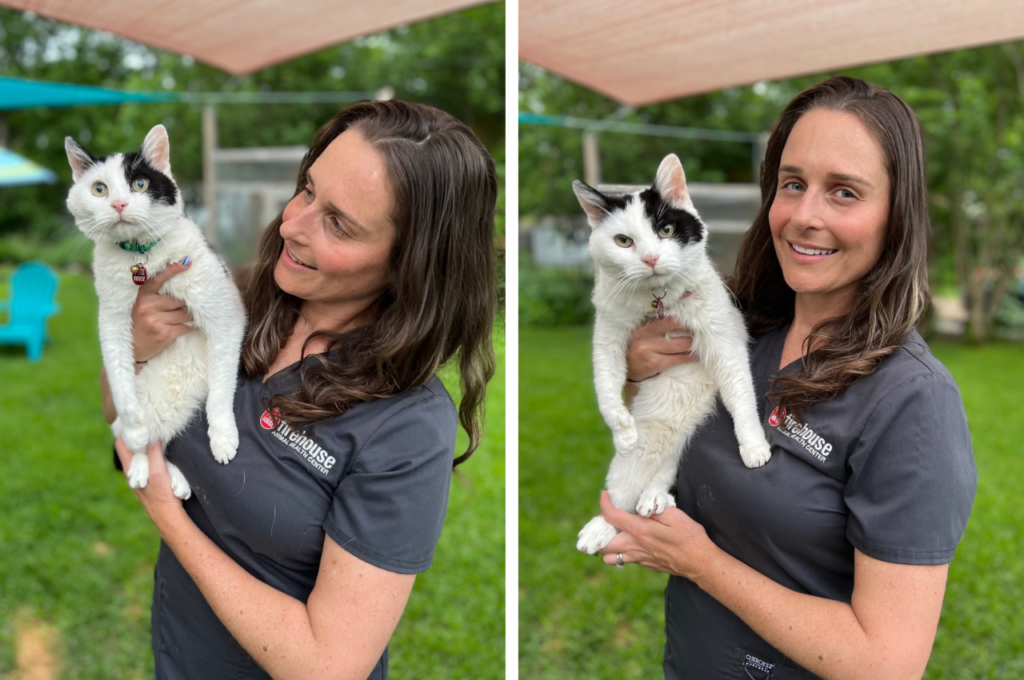3 min read

By the time our pets are seniors, the bonds run deep.
“My cat, Sid, was found many years ago living as a street cat in Brooklyn, NY where my husband lived at the time,” says Georgie Chadwick, the new Hospital Manager at Firehouse Westlake.
“Sid wandered around the neighborhood, looking for food and hiding from people. He was in rough shape, with many broken teeth and a badly injured tail. My husband would often sit on the steps outside his home and whistle a tune. One day, Sid heard the whistling and came running out of the shadows! He jumped into my husband’s lap, reached up with his front paws and gave him the biggest, most affectionate head butt!
He’s now 14. He’s on special medication to ease his arthritis and phantom pain from his tail injury. We keep him healthy with his regular vet visits, a special diet, and blood tests twice a year.
Sid will still come running from any room in the house if you simply whistle a tune. He absolutely loves it! And we love him.”
We love your senior cats and dogs. Here are 5 tips for nurturing them each day.
1. Daily brain stimulation for dogs & cats
Treat your pet’s brain as a muscle that needs daily exercise.
-Serve meals in food puzzles. Or, hide food throughout your home for your pet to seek out. Both cats and dogs enjoy this kind of activity.
-It turns out you can teach an old dog new tricks. Use lure or clicker training to encourage your dog to think for himself. Remember to use positive reinforcement training methods!
-Rotate pet toys to keep them fresh, enticing your pet to play. Play with your cat in a new room, or add a cardboard box to the fun.
-Change your walking or playtime routine. Hike a different trail, walk in a new neighborhood, or check out a fresh dog park.
-Older dogs can help train a puppy. Pups younger than 16 weeks need to socialize with older dogs. Make sure your dog is vaccinated against Parvo, and then invite a friend and his or her new pup to play in your backyard.
2. Serve the right amount of the right foods
As pets age, they tend to become pickier about their food. Yet, proper nutrition ensures your pet remains lean and nourished.
Tip: warm canned food in the microwave for a few seconds.
In addition to finding a diet your pet enjoys, it’s important to ensure they remain at a healthy weight. Feed them food with the proper levels of calories, protein, fat, carbs, vitamins, and minerals.
Fun fact: Senior dogs require fewer calories than their adult counterparts. Senior cats often require extra calories.
3. Routine exercise maintains muscle mass and healthy joints
As pets age, they move a little less. Routine exercise maintains your pet’s muscle mass and promotes healthy joints.
To further ease joints, invest in high-quality orthopedic pet beds. Fluffy beds might look appealing, but they lack support, essentially leaving your pet to sleep on the hard floor. Add extra comfort with a heating pad designed to soothe aches and pains.
Before changing your pet’s diet plan and exercise routine, speak with us about the healthiest choice available.
4. Looking to adopt? Many senior pets need a loving home
Sometimes, a family must move and can’t take their beloved pet with them. Other times, a pet owner may have health problems or pass away.
Whatever the reason, there are more senior pets than puppies and kittens available for adoption. You can basically custom order your furry companion.
Looking for a particular breed? There are a lot of breed-specific rescues all over the country! Want a certain color? Size? One that doesn’t shed? One that will love laying on the couch all weekend with you? Whatever you’re looking for, there’s a senior shelter pet out there that will match your criteria.
5. New options for chronic pain
Medical advances have improved our beloved senior pet’s quality of life. New medicines, supplements, and procedures can offer comfort as pets age. Acupuncture and chiropractic services are also an option for senior pets.
There are so many ways to help your pet if you’ve noticed their quality of life slipping. We’re always here to help ensure your senior pet’s golden years are the best they can be.
Call us with requests for information or to set up your pets’ yearly check-ups.


